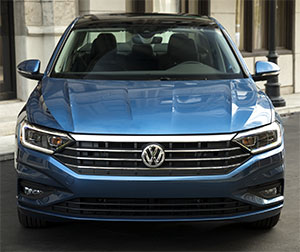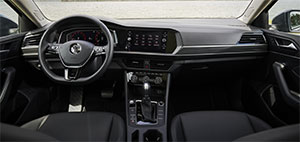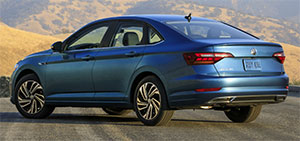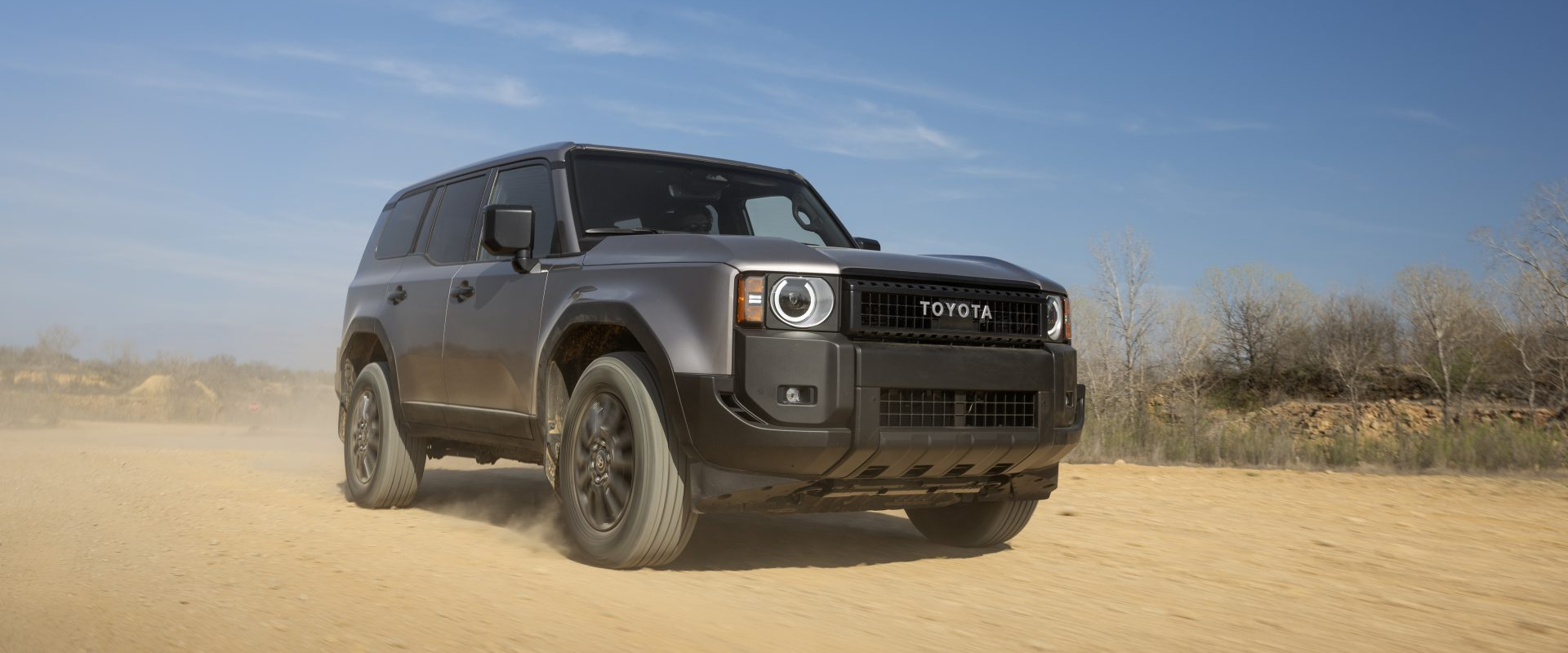2019 Volkswagen Jetta
Volkswagen needs you…and a lot of other Americans…to reach their goal of 5% U.S. market share. It’s about 2% today. Their new atlas and Tiguan SUVs will certainly help, but they need more. So, enter an all-new Jetta compact sedan. Now, VW says that more than ever, it was designed with Amercian buyers in mind. But in doing so, VW risks ruining what made Jetta popular in the first place. So let’s see how well VW walks that tight rope.
With over 17½ million sold since 1979, the Volkswagen Jetta is a well-recognized, global nameplate. When the last Jetta sedan debuted right around the beginning of this decade, it was part of Volkswagen’s new strategy to not only build cars in North America, but to tailor them specifically for American drivers.
What that meant was less emphasis on ride-and-handling, making space and price the priorities. That “bigger and cheaper is better” approach yielded exactly the desired results, record sales.
 For 2019, the 7th gen. Volkswagen Jetta not only doubles down on that strategy, but attempts to bring more driving excitement back into the mix.
For 2019, the 7th gen. Volkswagen Jetta not only doubles down on that strategy, but attempts to bring more driving excitement back into the mix.
While it still bears a resemblance to the conservative Passat, it’s certainly the most dynamic Jetta we’ve ever seen, and if you were expecting to hear the words “coupe-like profile”; well, they’re here.
The other usual descriptors apply as well, longer wheelbase, shorter overhangs, wider track; and cliché as it all may be, it’s hard to argue with the very handsome results.
A slicker shape is only part of what VW has done to get back some of the fuel economy lost without diesel or hybrid models. Active grille shutters up front, and while technically the same engine, the 1.4-liter turbo behind that grille is now tuned for more efficiency.
3-horsepower was lost in that transformation, now at 147; but torque remains the same at 184 lb-ft.
Furthering the theme, base cars get an extra gear for a 6-speed manual, and the optional automatic is now an 8-speed.
 The results are improved Government Fuel Economy Ratings of 30-City, 40-Highway, and 34-Combined; the same regardless of transmission.
The results are improved Government Fuel Economy Ratings of 30-City, 40-Highway, and 34-Combined; the same regardless of transmission.
While far from flashy inside, the exaggerated tilt of the center stack, sets a more driver-oriented tone to the space; and there’s much less hard plastic to be found, leaving nothing much to complain about.
And impressive features like the digital dash won’t be found anywhere else in this segment.
Top SEL Premium trim will also get you leather seats, both heated and ventilated; a new 8-inch Discover Media infotainment with navigation; selectable drive modes, and a 10-color LED ambient lighting system.
There is indeed plenty of space inside to get comfortable, no matter whether you’re the driver or just along for the ride. And cargo space is plentiful as well, at 14.1 cubic-ft.; 60/40 split-folding seatbacks are standard.
 Our early drive time came around Raleigh, North Carolina; and we’ll jump right in with talk of the suspension. Yes, a torsion beam is back at the rear on all trims. And while it’s easy to complain; for American Jetta buyers, it’s likely the ideal blend of capability with great everyday comfort.
Our early drive time came around Raleigh, North Carolina; and we’ll jump right in with talk of the suspension. Yes, a torsion beam is back at the rear on all trims. And while it’s easy to complain; for American Jetta buyers, it’s likely the ideal blend of capability with great everyday comfort.
And, it keeps costs down. Helping offset that is the fact that that torsion beam is now bolted to VW’s MQB architecture. Does it provide A4-like sport sedan agility? Not quite. Is it a sensibly entertaining everyday compact sedan? We’d say yes and then some. Certainly more lively than segment leaders Honda Civic and Toyota Corolla.
The new 8-speed automatic stays very busy managing power delivery from the little 1.4-liter; but it does so without undo effort. Sporty R-Line trim has no any added power, but it does get an XDS electronic differential, unique wheels, black trim, and dual exhaust tips.
VW is certainly attempting to attract your bucks by delivering as much bang as possible; very well equipped base S trim starts at $19,395, down 100 bucks from last year; top trim SEL Premium goes for $27,795. Plus, VW’s new People First warranty includes bumper-to-bumper protection for 6 years or 72,000 miles.
It would be foolish to expect the 2019 Volkswagen Jetta alone to put the brand’s sale’s goal within reach. But, it is another correct step in that direction. VW has walked the tight rope well. So, if you’re thinking about a compact sedan, with Corolla and Civic on your list, we think you should add the very entertaining VW Jetta at the top.
Specifications
- Engine: 1.4 liter
- Horsepower: 147
- Torque: 184 lb-ft.
- EPA: 30 mpg city / 40 mpg highway
2024 Toyota Land Cruiser
Toyota’s Go Anywhere Globetrotter Returns To U.S.
Every once in a while, we all need a reset. A time to get back to basics and prioritize the things that really matter. Well, for the Toyota Land Cruiser that time is now. So, let’s find out if that means bigger and better things for Toyota’s iconic off-roader.
The Toyota Land Cruiser’s status among the global off-road community is legendary, and it’s hard to imagine there’s any corner of the earth where a Land Cruiser hasn’t kicked up a little dust or mud. Well, 2024 sees the return of the Land Cruiser to the U.S. market after a 3-year hiatus, getting a major reset for the journey.
The reset comes mostly by no longer being based on the large three-row “300-series” chassis, but a new version of the smaller “200-series,” now known as the J250. As with the latest Tacoma, it uses the Tundra pickup’s full-size steel frame.
While the main Land Cruiser model, which goes by simply Land Cruiser, is packed full of luxury and convenience features, there is also a stripped-down model known as the 1958, honoring the first year the Land Cruiser made landfall here in North America. And it is that 1958 we have here, and we were glad to see it, as it also celebrates the original’s back-to-basics approach as a blank canvas for you to personalize as you tackle more and more adventures.
Not that it’s fully stripped down, as 8-inch touchscreen infotainment, a 7-inch full-color multi-information display, and automatic climate control are still standard. Plus, some seriously durable materials, and great heated cloth front seats that throw off some get serious 1990s Tacoma vibes.
But outside, there’s a definite lack of flashy trim and basic looking 18-inch wheels with Yokohama Geolander all-season tires; plus, big chunky bumpers and tilt-up back glass, which is a rarity that we appreciate. Though there is a little too much plastic in places that are sure to see some abuse if you do any significant off-roading.
It even feels a little rough around the edges, but for us it just adds to the rugged old-school utility vibe in a good way.
We did just that, both here in the Mid-Atlantic as well as in the California desert; and while there are some tech-forward driving aids, the actual hardware is in most cases plenty to get things done. That includes standard full-time dual-range four-wheel-drive, locking center and rear diffs, and 8.7-inches of ground clearance. A front stabilizer bar disconnect is also available to allow for increased articulation.
Who needs a V6 or even a V8 when you’ve got Toyota’s i-FORCE MAX setup at your disposal with 326 horsepower and 465 lb-ft of torque coming from a 2.4-liter turbo-four with an electric motor sandwiched between the engine and its eight-speed automatic transmission. Low speed torque delivery is impressive. It even feels a little rough around the edges, which may be a turn off to some, but for us it just adds to the rugged old-school utility vibe in a good way.
And it certainly feels quicker than an off roader needs to be, with an instant torque dump as soon as we eased on the throttle at our Mason Dixon test track; helping us get to 60 in 8.1 seconds and through the quarter-mile in 16.3 seconds at 86 mph. Considering the Land Cruiser’s terrain conquering mission, it behaved quite well in our handling course; it was plenty responsive to inputs, with less body roll than we expected and plenty of grip from the tires. The steering was light and quick but as expected didn’t provide much feel. Other than significant nosedive, braking performance was exceptional. Only 107-feet to panic stop us from 60 mph.
With the shift to the smaller size, there’s no more third row available, and cargo capacity now comes in at 46.2 cubic-feet with a max of a still healthy 82.1. Now, the best part of the Land Cruiser’s return is the entry price of $57,445. That’s about 30-grand less than what the last Land Cruiser went for back in 2021.
Whether it’s over the top fashion trends, mullets, or zombies; just when you think they’re dead, they come roaring back to life. Of course, we’re much happier to see the resurrection of this 2024 Toyota Land Cruiser than any of those things. Toyota is one brand that still recognizes the value of full-framed rugged rigs and has also acknowledged that sometimes less really is more. The Godfather of Toyota off-roading is back and better than ever.







